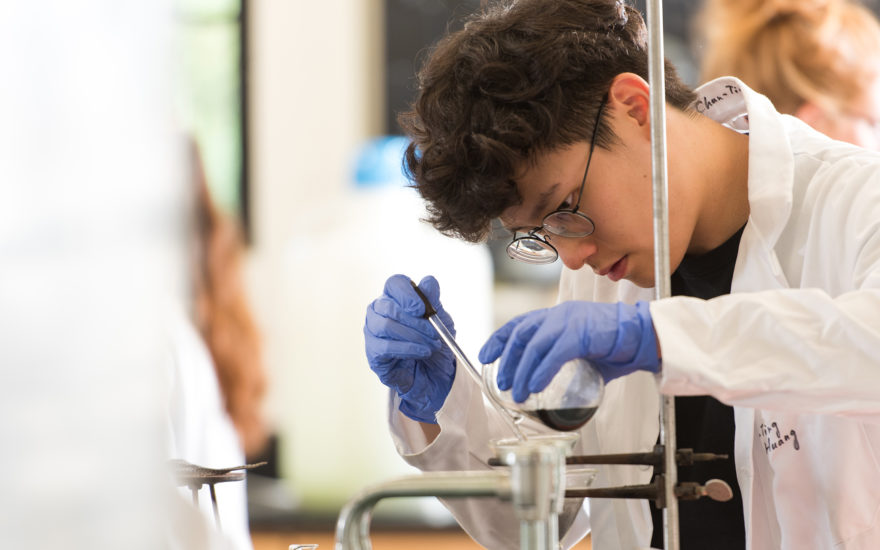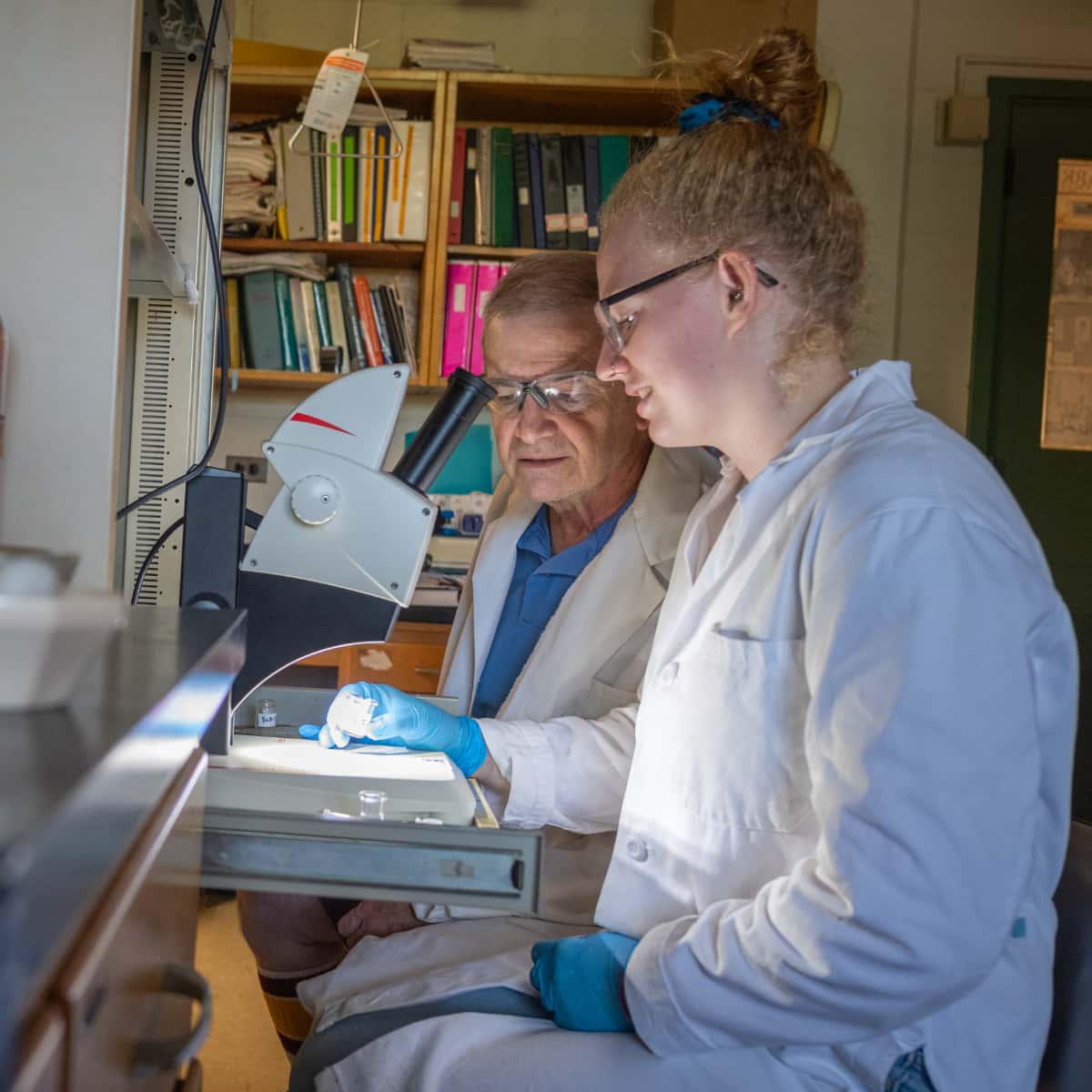Majoring in chemistry at Clark puts the physical makeup of our world — from nanoparticles to DNA and the elements on the periodic table — under your microscope and into your hands. You’ll engage in research as early as your first year and collaborate on new discoveries with leading professors in the field.


Why study chemistry at Clark?
- Conduct research alongside faculty members and doctoral students, using cutting-edge research equipment like our nuclear magnetic resonance spectrometer in our state-of-the-art labs.
- Customize your educational experience by choosing from the standard track or the American Chemical Society (ACS)-certified track.
- Study with professors who have expertise in a diverse range of specialties, including an American Chemical Society Fellow and a John A. Timm Award recipient (the highest honor given by the New England Association of Chemistry Teachers).
4 + 1—An advanced degree within reach
The 4+1 Accelerated Master’s provides an opportunity to earn a pathway to a master’s degree — with one year of additional study and available tuition scholarships. Consider the following option for this major:
- Apply
- Request Info
Are you ready to take the first step?
Featured Courses

Crystallography, Diffraction, and Scattering Methods
Use diffraction and scattering techniques (including small angle and quasi-elastic neutron scattering) to investigate the structure and properties of a variety of biochemical, inorganic, and organic materials.

Investigate the structure and properties of inorganic substances while contributing to a rigorous research project that aims to produce results of sufficient quality and quantity suitable for publication.

Computers in Biochemistry
Gain experience using software packages to analyze chemical and biochemical systems retrieval, such as analysis of DNA and protein sequence information, and simulations of protein dynamics and ligand binding.
As a chemistry major, you will select one of two tracks based on your career goals:
- The American Chemical Society (ACS)-certified track, which meets the entrance requirements for graduate study in chemistry, is recommended if you want to pursue a profession in the chemical sciences.
- The standard track, which offers more latitude in course selection, is appropriate for students who plan to pursue one of the health professions* (medical, dental, veterinary), public school teaching, technical sales, or other chemistry-related fields.
Curriculum update
Effective fall 2025, Clark offers new majors a B.S. in Chemistry instead of a B.A. Contact your advisor for details.
At Clark you’ll get more than a great education; you’ll also be prepared for a long, productive career and life of consequence. And once you’ve completed your degree, you can join other Clark alumni who have gone on to work for great organizations and attend some of the best graduate schools in the world.
Health Professions and Life Sciences
Science, Data, and Technology
Chemistry
Merck Pharmaceuticals
Clinical Director
MDS PharmaServices
Chemist
Colgate Palmolive
Forensic Pathologist
San Mateo Country, Calif.
Professor
University of Hartford
If you’re considering a career teaching chemistry at the high school level, we encourage you to check out the Noyce Scholarship program. A robust Prehealth Advising Program is available if you’re interested in pursuing a career in the health professions.
The Clark Experience
The Clark Experience brings together the exceptional education you’ll receive in the classroom and so much more. Through focus and flexibility, it ensures you’ll leave Clark with the creativity, confidence, and resilience to succeed and lead a life of meaning and consequence.
Frequently Asked Questions
What can I do with a major in chemistry?
The chemistry major prepares you for a variety of exciting next steps. You might go on to graduate school to further your knowledge of the field, enter one of the health professions (medical, dental or veterinary), or become a public school teacher. Other career paths include product development; technical sales; marketing and communications; hazardous waste management; forensic science; chemical engineering; and intellectual property law.
What skills will I learn as a chemistry major?
- Solve problems that require the analysis of unknown substances or the synthesis of new molecules or materials.
- Collaborate efficiently and productively with colleagues in other fields, such as biology, physics, materials science, environmental science, or biomedical engineering.
- Read primary literature critically, analyze complex data, and identify relevant trends.
- Communicate information effectively, both orally and in writing.
- Work as part of a team.
What labs and facilities are available?
Learn about our facilities and equipment available for teaching and research, and the resources at Clark’s Carlson Science Library.
Are there academic achievement awards in chemistry?
American Chemical Society Undergraduate Award in Analytical Chemistry
The American Chemical Society Undergraduate Award in Analytical Chemistry is awarded to an outstanding student who has displayed an interest and aptitude for analytical chemistry.
The American Chemical Society Undergraduate Award in Physical Chemistry
The American Chemical Society Undergraduate Award in Analytical Chemistry is awarded to an outstanding student who has displayed an interest and aptitude for physical chemistry.
American Chemical Society, Division of Organic Chemistry Undergraduate Award in Organic Chemistry
The American Chemical Society, Division of Organic Chemistry Undergraduate Award in Organic Chemistry recognizes a senior who displays a significant aptitude for organic chemistry.
American Chemical Society, Division of Inorganic Chemistry Undergraduate Award in Inorganic Chemistry
The American Chemical Society, Division of Inorganic Chemistry Undergraduate Award in Organic Chemistry recognizes a senior who displays a significant aptitude for inorganic chemistry.
American Institute of Chemists Foundation Student Award
The American Institute of Chemists Foundation Student Award is awarded to one chemistry and one biochemistry and molecular biology senior for outstanding records of achievement.
Chemical Rubber Company Press Freshman Chemistry Achievement Award
The Chemical Rubber Company Press Freshman Chemistry Achievement Award, sponsored by the Taylor & Francis Group, is awarded in recognition of a student’s outstanding academic achievement in chemistry.
Organic Chemistry Prize
The Organic Chemistry Prize is awarded to an undergraduate student for his/her outstanding performance in organic chemistry.
Wen-Yang Wen Award for Excellence in Physical Chemistry
The Wen-Yang Wen Endowed Prize for Excellence in Chemistry was established by the family and friends of Weng-Yeng Wen to honor his retirement as a professor at Clark University. The income from this endowment is used to provide a prize for an outstanding upperclassman studying chemistry or biochemistry.
Is there an honors program for chemistry majors?
During your junior year, you might be accepted into the chemistry honors program. Joining the program means you’ll work closely with a professor to create a thesis on a topic of your choice. Examples of recent honors thesis topics are:
- Autonomous Ion-Selective Electrodes for Measuring Carbonate in Seawater Systems
- Paraffin-Bearing Polymethacrylates and Polymethacrylamides as Solid-Solid Phase Change Materials: Effect of Spacer Length on Heat Storage Capacity
- Polymer-Templated Wet Chemical Synthesis of Plasmonic Nanoparticles
Be a force for change.
Come study at a small research university with a strong liberal arts core.

